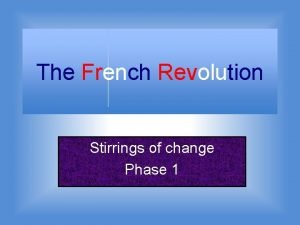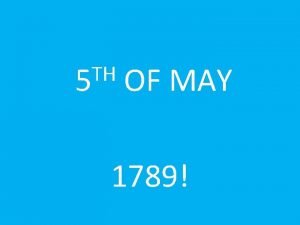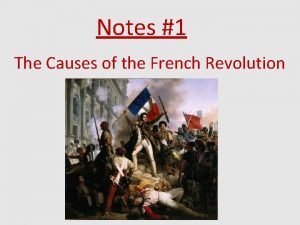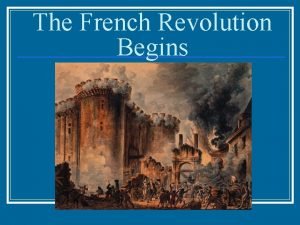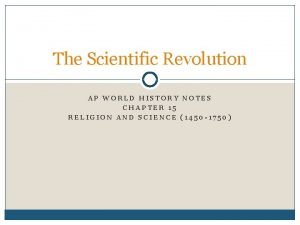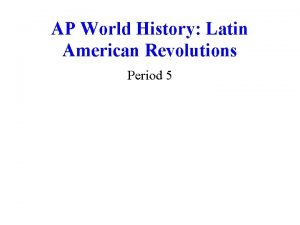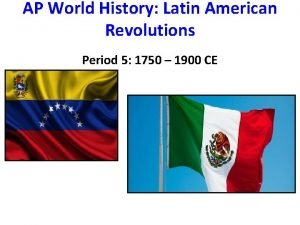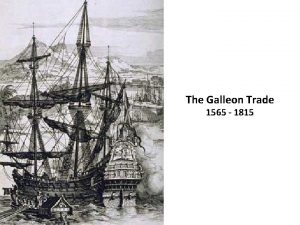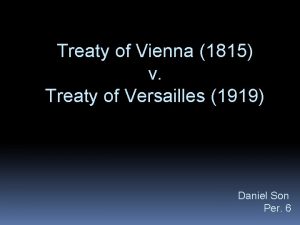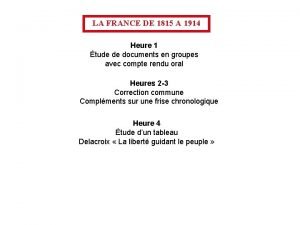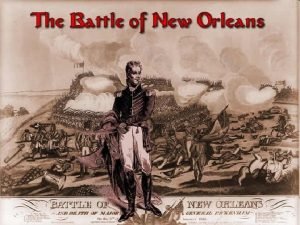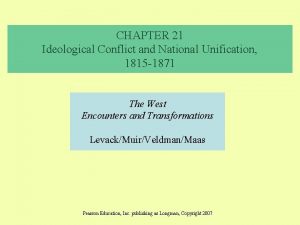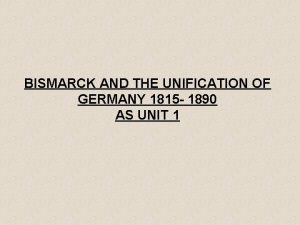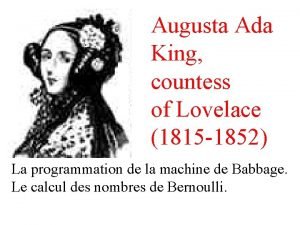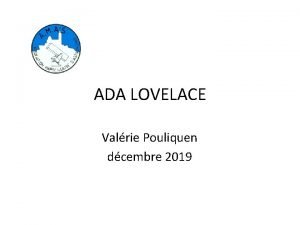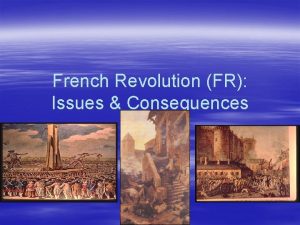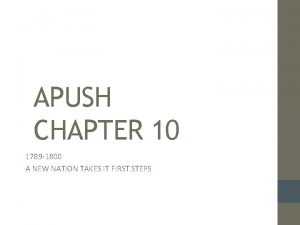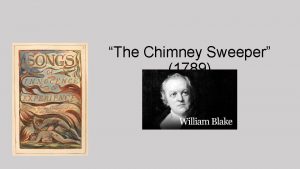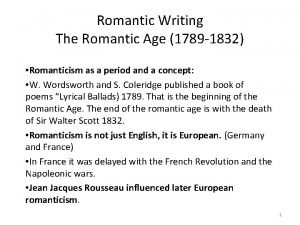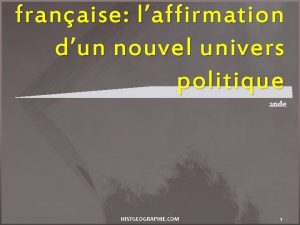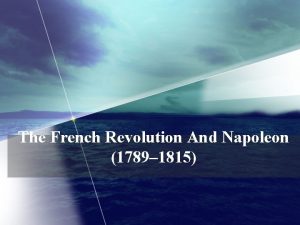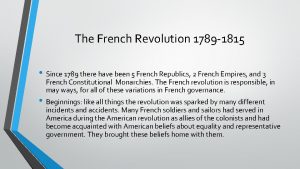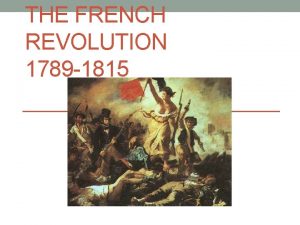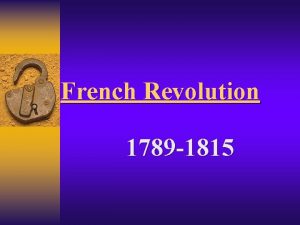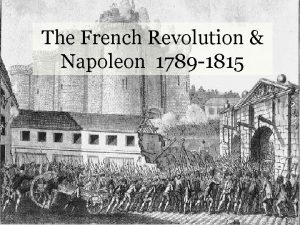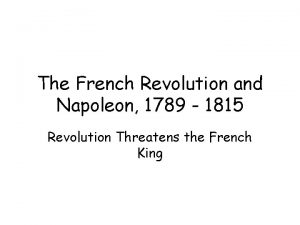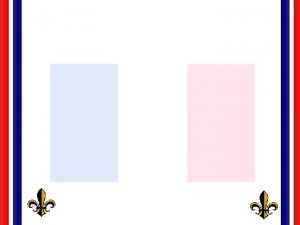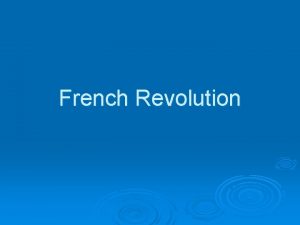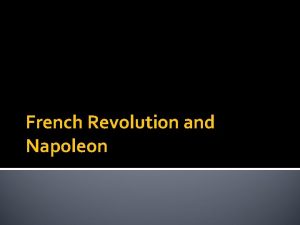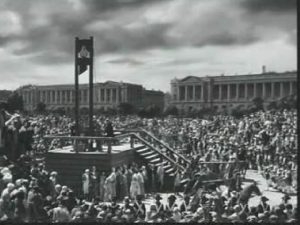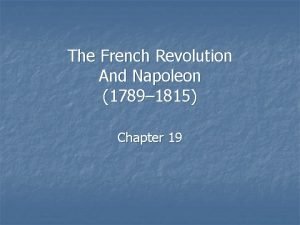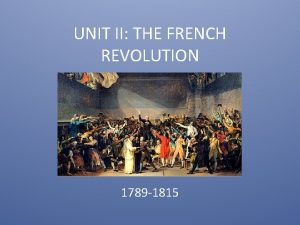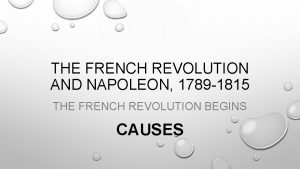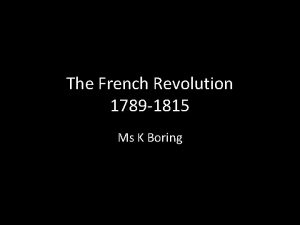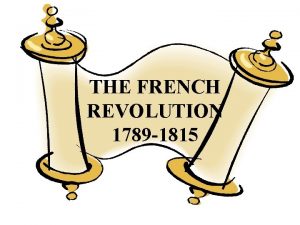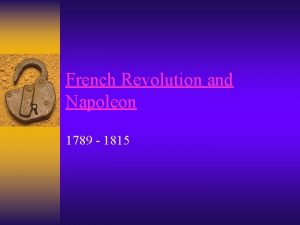The French Revolution 1789 1815 AP World History




































- Slides: 36

The French Revolution (1789 -1815) AP World History Notes Chapter 17 Atlantic Revolutions and their Echoes (1750 -1914)

American Revolution Bellwork • Which Enlightenment thinkers influences the American Revolution and the government created by it? • Locke, Montesquieu, Voltaire, Rousseau • Who financially supported the American Revolution? • France

Objective • WWBAT: Introduce the causes of the French Revolution and the multiple attempts at creating a success new government

Interactive Notebook Check Up • 3/29/2016 • The French Revolution and Napoleon • This will be two pages

State of France Start of the Revolution New Government/French Republic

Reign of Terror The Directory The Consulate

The State of France • Compromised of 3 “estates” or legal orders • Estate 1 = the clergy & 1% of the population • Estate 2 = the nobility & 1% of the population • Estate 3 = the commoners & 98% of the population

Urban Third Estate • The urban third estate was made up of craftsmen, merchants, business owners • They were for the most part well off, or at least financially comfortable • The more well off members of the Third Estate became known as the Bourgeoisies

The Bourgeoisies

Urban Third Estate • The Bourgeoisies was not happy with the fact that they were wealthy and yet treated as inferiors • This is class of people many of the Enlightenment thinkers came from



The State of France • Louis, like other European, ruled through something called divine right • This meant that God wanted him and his family to rule • This rule through divine right justified his power to be an absolute monarchy

King Louis XVI Marie Antoinette

The State of France • On the brink of bankruptcy and government in debt • Commoners upset with higher prices of goods and an increased cost of living • Wealthy upper/middle class (bourgeoisie) = wanted more political power

The State of France • Louis, as well as the rest of the French royalty, lived an extremely extravagant life, even for European royalty • The best(or worst) example of the French wealth was the palace at Versailles • Let’s let Louis himself show us around…

The State of France • Louis inherited a massive debt from The 7 Years War (The French and Indian War) • On top of the debt The 7 Years War cost France territories in North America • This only worsened the debt situation because it meant that there was less money coming into the country to deal with the debt


The State of France • Louis was a passionate financial supporter of the American Revolution • This was in large part because France was historically an enemy of Britain and saw an opportunity to win back territory • All that France really gained from it’s support of American was even more debt, this new debt required France to levy a new tax

Start of the Revolution • King Louis XVI wanted to reform the tax system to make it more equal and efficient • At the time = clergy, nobility, and government officials = exempt from paying taxes • He called into session the Estates General = an ancient representative body • Consisted of representatives from the 3 estates • Each estate gets 1 vote Opening of the Estates General at Versailles -- May 5, 1789

Start of the Revolution • The 1 st and 2 nd estates could easily outvote the 3 rd estate and voted against these tax reforms • 3 rd estate thought this was unfair wanted to reform government so that votes were based on each representative, not on each estate Meeting of the Estates General in 1789 • King refused because he didn’t want the lowest class to control everything • Result = 3 rd estate broke away and formed its own organization = the National Assembly

Start of the Revolution • 3 rd Estate met at indoor tennis court • National Assembly swore the “Tennis Court Oath” = promised they wouldn’t disband until they had written a new constitution for France Painting of the National Assembly convening at an indoor tennis court

Start of the Revolution • Drafted the “Declaration of the Rights of Man and Citizen” • Influenced by the Declaration of Independence • Said all people were created equal • Guaranteed freedoms of speech, press, and religion

Revolution in the Air • King Louis XVI sensed trouble and called for more troops to protect Versailles and Paris • Spirit of rebellion was everywhere – from the meetings of the National Assembly to the streets of Paris The Gathering of French Troops

Start of the Revolution • Bastille was a prison in Paris • Symbolized the injustices of the monarchy • Mob stormed the Bastille on July 14, 1789 • The prison fell and prisoners were freed

Start of the Revolution • More violence followed = called the Great Fear • Peasants armed themselves and prepared for a revolution • Peasants attacked the castles of their lords • Fields and crops burned • Documents of dues and payments burned • Buildings attacked and destroyed

New Government • In an effort to end the violence: • Nobles gave up their aristocratic privileges & tax exemption • Feudalism abolished • Agreement that all male citizens could hold offices in the government, army, or church

New Government • Church lands were sold to raise revenue and pay government debts Cartoon Representation of the Confiscation of Church Lands • National Assembly passed the Civil Constitution of the Clergy = put French Church under government control; weakened the Catholic Church

March on Versailles • Despite these changes, King Louis XVI sill refused to accept the Declaration of Rights and recognize the National Assembly • March on Versailles led by women who were upset with harsh economic conditions and bread shortages • Marched to the King’s palace and demanded he move the court to Paris wanted him to show support for the new Assembly

New Government • Huge mob joined with pitchforks and torches • Guards couldn’t fight off the thousands of people • King Louis XVI agreed to move to Paris

New Government • Created a new Constitution in 1791 • Kept the monarchy but limited its power • Set up a unicameral legislature • One-house assembly chosen by the voters • New constitution led to more unrest some thought it went too far, others thought it didn’t go far enough • Violence continued throughout the countryside • Fear of breakdown of law and order

New Government • In 1791 = King Louis XVI and Marie Antoinette tried to escape Paris and go to Austria • Feared more violence • Were arrested before they got very far • Forced to return to Paris Escape Attempt of the Royal Family in June of 1791

The French Republic (1792) • France attempted to create a whole new society • Created a republic • Wrote a democratic constitution • Passed universal male suffrage = every man could vote “Lady Liberty” Leading the People • New calendar with “Year 1” in 1792 = marking a new start for France

The French Republic • The new Republic had to decide the fate of King Louis XVI • Tried and convicted him of treason and conspiring against the nation • Beheaded King Louis XVI on the guillotine in 1793 • Crowds celebrated his death


Marie Antoinette met the same fate years later
 The tennis court oath
The tennis court oath Immediate cause of french revolution
Immediate cause of french revolution 5th may 1789
5th may 1789 Three causes of french revolution
Three causes of french revolution Russian revolution vs french revolution
Russian revolution vs french revolution Could the french revolution have been avoided
Could the french revolution have been avoided Storming of the bastille political cartoon
Storming of the bastille political cartoon Scientific revolution ap world history
Scientific revolution ap world history Collectivization ap world history
Collectivization ap world history Chinese communist party ap world history
Chinese communist party ap world history Duma definition ap world history
Duma definition ap world history Russian revolution of 1905 definition ap world history
Russian revolution of 1905 definition ap world history Monroe doctrine definition ap world history
Monroe doctrine definition ap world history Francisco madero definition ap world history
Francisco madero definition ap world history Ap world history chapter 25 africa and the atlantic world
Ap world history chapter 25 africa and the atlantic world Dangerous world tour
Dangerous world tour Ottoman empire in 1750
Ottoman empire in 1750 Galleon trade 1565-1815
Galleon trade 1565-1815 Congresul de la viena ppt
Congresul de la viena ppt Treaty of versailles 1815
Treaty of versailles 1815 Egzaminatorius kodai
Egzaminatorius kodai Frise chronologique 1815 à 1870
Frise chronologique 1815 à 1870 Frise chronologique de 1815 à 1870
Frise chronologique de 1815 à 1870 In 1914 we took a little trip
In 1914 we took a little trip 1815
1815 Liberalism and nationalism in germany 1815-71
Liberalism and nationalism in germany 1815-71 Augusta ada king, countess of lovelace
Augusta ada king, countess of lovelace Ada lovelace family background
Ada lovelace family background Metternichovský absolutismus
Metternichovský absolutismus The third agricultural revolution
The third agricultural revolution Europe in 1789
Europe in 1789 1789 apush
1789 apush 1789-1614
1789-1614 The chimney sweeper 1794
The chimney sweeper 1794 Bolton romanticism amp; politics 1789 1832 download
Bolton romanticism amp; politics 1789 1832 download Frise républiques françaises
Frise républiques françaises Napoleon 1789
Napoleon 1789
